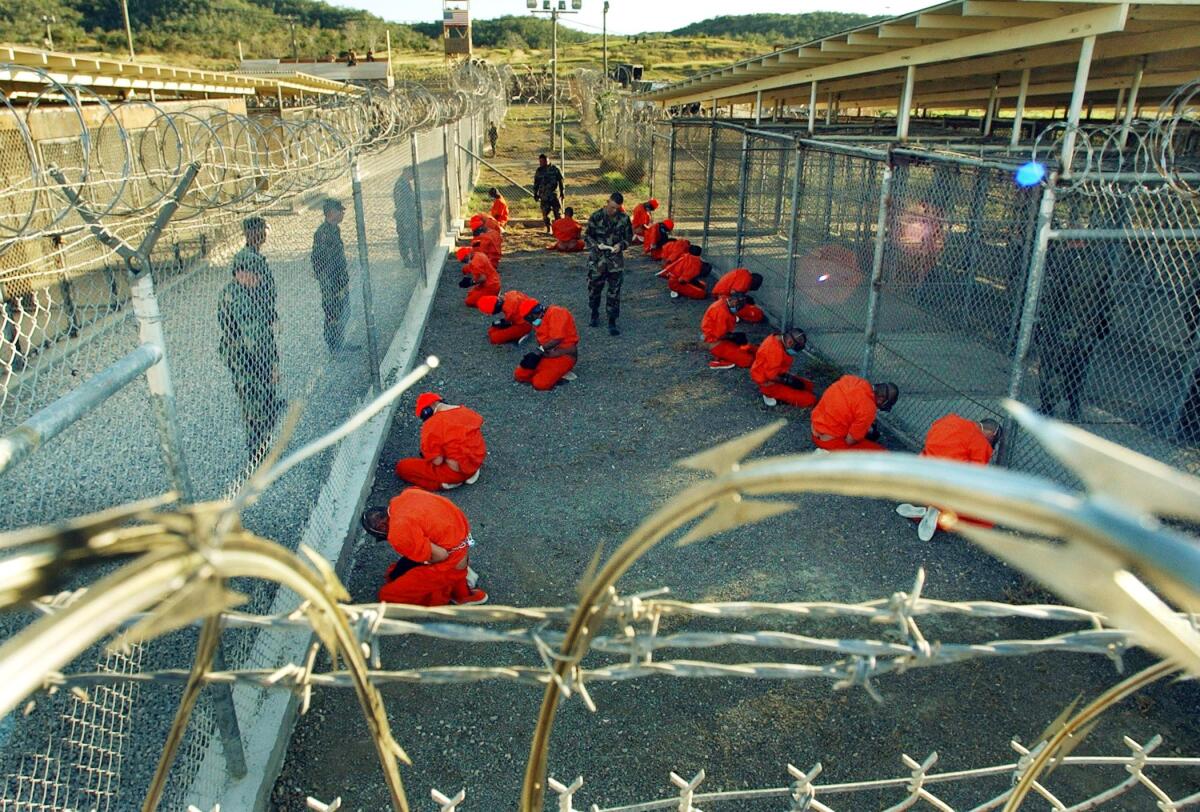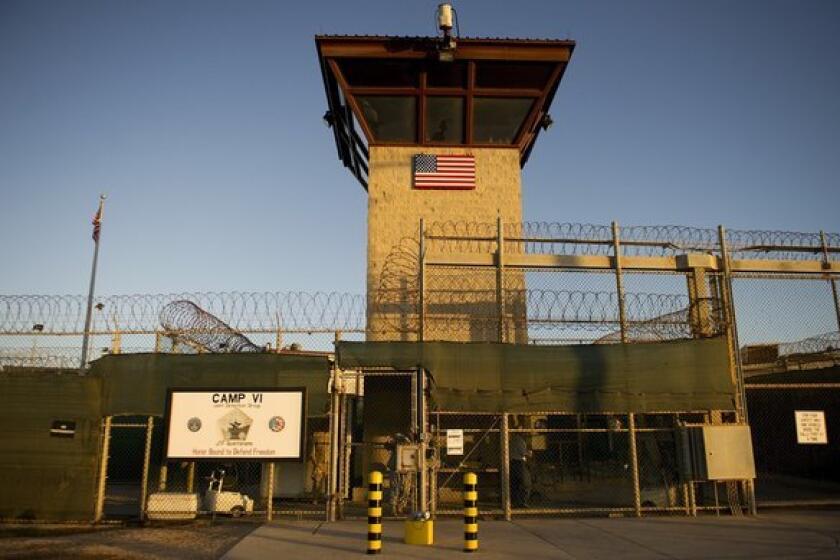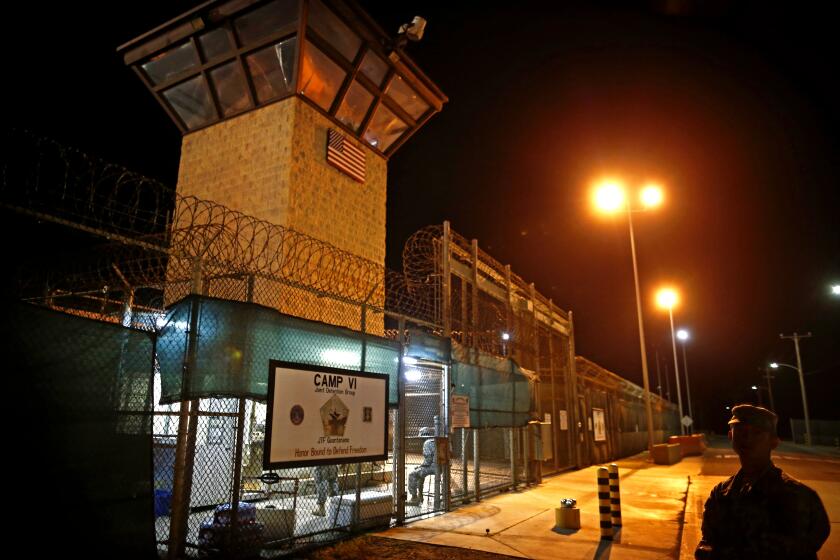Op-Ed: The first prisoners arrived at Guantanamo Bay 20 years ago. Will it ever close?

- Share via
On Jan. 11, 2002, a U.S. military plane landed at our base in Guantanamo Bay, Cuba, and the first men deemed “the worst of the worst” by then-Vice President Dick Cheney were brought into the now-infamous detention center. Jumah Al-Dossari, a citizen of both Bahrain and Saudi Arabia whom I would eventually represent, arrived a few days later. He was held as an “enemy combatant” based on the accusation that he was a member of Al Qaeda, a claim made without substantiation or allegation that he had done anything to harm the U.S., its citizens or its allies.
Similarly, most detainees at Guantanamo were not said to have committed any hostile acts against the U.S. or its allies. Yet 20 years after the first prisoners were brought there, Guantanamo remains open largely because of congressional intransigence.
The U.S. chose Guantanamo to detain people captured in the “war on terror” after the Sept. 11, 2001, attacks, primarily because it was not on American soil. The government’s theory was that holding foreigners outside the U.S. would prevent our courts from exercising jurisdiction over claims by the detainees, effectively ensuring that those held would have no enforceable rights.
A current detainee speaks of the torture and humiliation he has experienced at Guantanamo since 2002.
But in 2004, the Supreme Court ruled in Rasul vs. Bush that detainees could file habeas corpus petitions, which allowed them to meet with lawyers. By then, the government’s assumption that those held in Guantanamo would be revealed as high-value terrorists had unraveled. Even the facility’s commanders admitted many detainees had just been in the wrong place at the wrong time.
When I first met Jumah in October 2004, I didn’t believe that all Guantanamo detainees were, as Donald Rumsfeld had described them, the “best-trained vicious killers.” Still, I was nervous. My anxiety quickly dissolved. Jumah looked too gaunt to be a physical threat and his smile was disarming. And we were quickly chatting about American movies (“Jumanji” was his favorite), his daughter and Egyptian cuisine. At one point, he asked if I was Jewish, based on my first name. When I told him no, he looked disappointed. “I heard the best lawyers were Jewish,” he said, before adding, “I’m sure you’re good too.”
During our visits over the next year, Jumah and I talked about family and romantic relationships. Over time, he had learned a lot of English from the guards, particularly slang. He said that once an interrogator threatened him, saying, “You can’t punk me, motherf—, I’m from Brooklyn.” We co-opted the line to express mock indignation with each other. Jumah also gained a command of racial epithets from the guards, but he made me promise not to tell his mother he knew those bad words.
In defending prisoners at Guantanamo prison, we’re defending the core values of the American legal system.
However, it was not all gallows humor and easy conversation. Jumah described abuses such as being beaten unconscious and having an interrogator smear what she said was menstrual blood on him, accounts corroborated by reports from U.S. personnel. But he said his most painful experience was being held in long-term solitary confinement.
In October 2004, on my fourth visit to Guantanamo, Jumah was despondent. After being released from the hospital following a hunger strike, he had been returned to isolation, contrary to what a doctor had promised. An hour into our meeting, he asked me to leave the room so he could use the bathroom. Soon after leaving, I started feeling anxious and cracked the door to the cell open. I saw Jumah hanging by his neck, unconscious, with blood flowing from a gash in his arm. He had emergency surgery and survived.
After this suicide attempt, I asked that Jumah be moved out of isolation.
Life didn’t stop while we were held for years inside the prison. We also dreamed and even followed U.S. politics.
When the military denied the request, our legal team sought intervention from the courts. The U.S. government argued that Jumah wasn’t isolated because guards gave him food through a slot in his door and he played checkers and ate pizza with interrogators. The court ruled it did not have authority to order modifications.
That decision underscored our team’s belief that there was no chance the court would ever order our clients’ release. Being released seemed to be a political exercise. All detainees who were citizens of Western European countries had gone home through diplomatic deals. We argued for such arrangements for our clients who were citizens of Bahrain, a U.S. ally, and I hoped this strategy would work before Jumah succeeded in killing himself.
In July 2007, and after several more suicide attempts, Jumah was released from Guantanamo and sent to Saudi Arabia through a diplomatic agreement. When I eventually visited him at his home there in 2009, I held his newborn daughter and ate dinner with his family. I wondered what the U.S. had gained from holding him for over five years.
Twenty years after Guantanamo opened, that question applies to the entire operation. Seven hundred and thirty-two detainees, most held for years, have been released. Of the 39 people still imprisoned, most are detained as “combatants.” Thirteen have been cleared for release yet remain jailed. And, of course, the war in Afghanistan is over. The five that have been charged with helping plot the 9/11 attacks have yet to be tried.
The world has forgotten me. Though I once had friends, now I have nobody.
Keeping Guantanamo open costs about $13 million annually per detainee and the facility is a symbol of human rights abuses by the U.S. But it remains open almost entirely because Congress has barred transferring detainees to prisons in the U.S. and has restricted transfers to other countries.
There is little reason to believe that things will change in the near future, though President Biden, like Presidents Obama and George W. Bush before him, has said he wants to close Guantanamo.
If a solution to closing Guantanamo isn’t found, the U.S. will end up perpetually imprisoning an aging population of men who should be tried in federal courts, or should have been set free long ago.
Joshua Colangelo-Bryan is a lawyer at Dorsey & Whitney and a consultant to Human Rights Watch. He was part of a group of firms and nonprofits that represented Guantanamo detainees pro bono.
More to Read
A cure for the common opinion
Get thought-provoking perspectives with our weekly newsletter.
You may occasionally receive promotional content from the Los Angeles Times.












